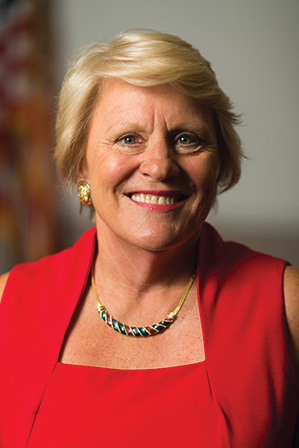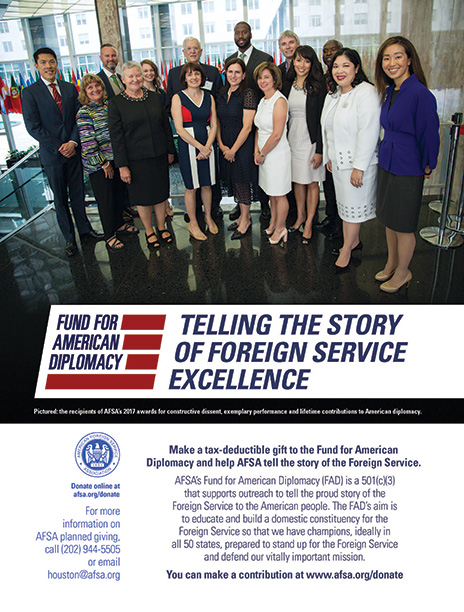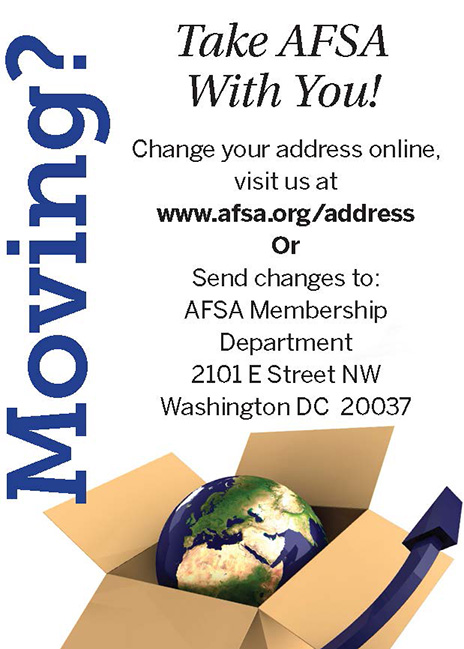Building Enduring Support for the Foreign Service
President's Views
BY BARBARA STEPHENSON

As I begin my second term as AFSA president, having been elected on a platform of continuing the work begun two years ago by the Strong Diplomacy slate, I reviewed my very first President’s Views column.
In that maiden column, I made this commitment:
“I will speak to everyone during my tenure as AFSA president of the extraordinary demands that are made of the extraordinary people who answer the call to serve.
“As part of our pledge to worldwide availability, we in the Foreign Service willingly agree—in fact, work hard to prevail in a highly competitive selection process—to take on a career that requires us to serve in remote corners of the globe, often in unsafe and unhealthy conditions of genuine hardship, where good schools for our kids and decent jobs for our spouses are rare.
“We willingly agree to rotate jobs every two to three years as part of our competitive up-or-out promotions system. While that means we never get to settle comfortably in a job and a place we love, we know this is the path to the broad range of experience we need to grow as Foreign Service professionals and prepare to lead America’s foreign policy.
“Ours is a remarkable story of service, of delivering for our country in the face of unique challenges. I want us to own that story, to take pride and find strength in it, and to share it with the American people.”
I renew that commitment to you now, as I begin my second and final term as AFSA president, and I ask that you continue to do your part to own our story and to tell it effectively to our fellow Americans.
Why? Because it is working. I see concrete evidence that our fellow Americans increasingly know who we are, what we do, and why it matters.
For instance, in its reporting on the moving ceremony on Foreign Service Day, May 5, at which we in Washington and many of you at posts around the world paused for a moment to honor the 248 fallen colleagues whose names appear on AFSA’s memorial plaques, The Washington Post refers to the “nobility” of the Foreign Service.
And in his July 28 New York Times Sunday Review piece, Roger Cohen writes, “Over the years, in war zones and outside them, I’ve known American Foreign Service officers for whom the word ‘noble’ was not misplaced.”
So have I, and, so, I suspect, have you.
Explicit support for the Foreign Service now clearly extends to Capitol Hill, where the Senate Foreign Relations Committee in late July voted out the 2018 State authorization bill. I encourage you to read the entire bill, but particularly want to draw your attention to Section 101, “Sense of the Congress on Importance of Department of State’s Work,” which is essentially a tribute to the Foreign Service and the importance of our work.
Section 101 asserts that “United States global engagement is key,” and “United States leadership is indispensable in light of the many complex and interconnected threats facing the United States and the world”—challenges that “cannot be addressed without sustained and robust United States diplomatic and development leadership.”
The “vital” work of State and USAID, Section 101 states, “is critical to the projection of American power and leadership worldwide, and without which Americans would be less safe, our economic power would be diminished, and global stability and prosperity would suffer.”
If this language sounds familiar, it should, as it echoes messages AFSA has been pushing out across the country, as well as on the Hill, for many months now. In a word: Nine in 10 Americans favor strong American global leadership, which is unthinkable without a strong, professional Foreign Service deployed around the world protecting and defending America’s people, interests and values.
To all of you who took up and delivered this message, I say thank you—and please keep up the good work. Own your story of remarkable service. Polish it. Tell it with pride. Every time you do, you make the Foreign Service stronger by building broad and enduring support for us and the essential work we do to maintain America’s global leadership.




